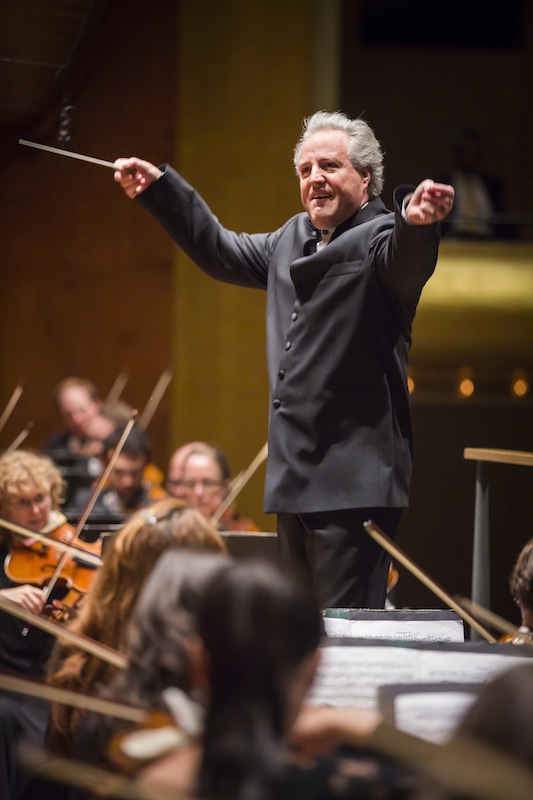Honeck strikes sparks with New York Philharmonic in favored Austro-German rep

Manfred Honeck conducted the New York Philharmonic in music of Johann Strauss Jr., Mozart and Brahms Thursday night. Photo: Chris Lee
The New York Philharmonic’s conductor auditions continue apace. Last week we had Susanna Mälkki, and on Thursday Manfred Honeck, himself a strong candidate to succeed Alan Gilbert, opened a weekend series that shows the Austrian conductor at his best.
This concert left little doubt that Honeck is a conductor of superior musicianship who is able to bring life to the standard repertoire. His opening item, the overture to Johann Strauss II’s Die Fledermaus, was as bombastic, whimsical, and delightful as it’s ever been. Every episode was finely crafted and the sound that Honeck drew out of the orchestra was enormous.
Augustin Hadelich, the celebrated young violinist, was the soloist for Mozart’s Violin Concerto No. 5, the composer’s greatest entry in the genre. There is a roughness in Hadelich’s sound that is somewhat unfamiliar in Mozart, but not altogether unwelcome: the “Turkish” concerto is, like all of Mozart’s music, an elegant work, but it does not deserve the sort of dainty treatment it is often given, particularly in its first two movements. The Allegro aperto still had all of its shining grace, and the Adagio was a simple, heartfelt elegy, despite the violinist’s tendency to push his tone slightly.
Hadelich played his own cadenzas, which have something of Joseph Joachim’s virtuosic spirit about them. They are well crafted, if stylistically odd—the brief cadenza of the last movement showed a chromatic polyphony that seemed completely out of context, expressive though it was. The finale was otherwise splendid, a fiery middle section book-ended by a charming rondeau.
Among the twenty-four caprices Paganini wrote there are more than a few that show sparkling wit and musical ingenuity, dazzling and charming at the same time. The Fifth, Hadelich’s encore on Thursday, is not one of these. It is a pure technical study of almost no expressive capacity, and the only reason reason to pick it would be if the violinist felt that Mozart’s elegant concerto hadn’t given him enough of an opportunity to show off his fingerwork. Hadelich’s performance of the caprice had fire to it, though it wasn’t particularly clean and he cheated slightly by ignoring Paganini’s original, more difficult bowing.
As he has done in previous Philharmonic appearances, Honeck played to his strengths by selecting a beloved standard to anchor his program. He dove into Brahms’s Fourth Symphony, giving a performance that wasn’t exactly revelatory, but showed the kind of robust sound that the Philharmonic is capable of producing under a conductor who focuses on details of the orchestra’s tone. His stately tempo made the opening movement sigh, even as the strings gleamed.
He did not begin the Andante moderato until there was complete stillness in the hall, and the result was worth waiting for. The simplicity of the early bars was breathtaking to hear. The Scherzo, though perhaps more pompous than playful, was a boisterous, refreshing interlude, setting up a perfect contrast with the harrowing energy of the finale. Honeck met the challenge of guiding the development of this movement’s theme and letting it be heard without constantly reminding us that we’re listening to thirty-some variations.
Honeck is, without question, a first-rate conductor, as he showed both in this performance and a year ago when he led the Philharmonic in a superb Dvořák Ninth. Given the opportunity, his sound musicianship and attention to sonic detail could help this orchestra rediscover some of its distinctive character. It’s worth considering, though, whether Honeck’s conservative programming would mean walking back some of the progress that Gilbert has made in promoting contemporary music with the Philharmonic.
Thursday’s program will be repeated 2 p.m. Friday and 8 p.m. Saturday at Avery Fisher Hall. nyphil.org.